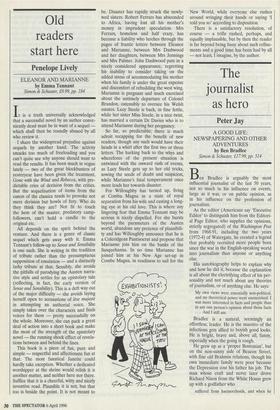Old readers start here
Penelope Lively
ELEANOR AND MARIANNE by Emma Tennant Simon & Schuster, f9.99, pp. 184 It is a truth universally acknowledged that a successful novel by an author conve- niently dead must be in want of a sequel which shall then be roundly abused by all who review it.
I share the widespread prejudice against sequels by another hand. The activity smacks too much of freeloading and you can't quite see why anyone should want to read the results. It has been much in vogue lately — two of the great blockbusters of yesteryear have been given the treatment, Gone with the Wind and Rebecca, with pre- dictable cries of derision from the critics. But the sequelisation of items from the canon of the classics tends to provoke not mere derision but howls of fury. Who do they think they are? Not fit to touch the hem of the master, predatory camp- followers, can't hold a candle to the original etc.
All depends on the spirit behind the venture. And there is a genre of classic sequel which gets away with it. Emma Tennant's follow-up to Sense and Sensibility is one such. She is writing in the tradition of tribute rather than the presumptuous supposition of emulation — and a distinctly larky tribute at that. Sensibly, she avoids the pitfalls of parodying the Austen narra- tive style and settles for an epistolary tale (reflecting, in fact, the early version of Sense and Sensibility). This is a deft way out of the major difficulty — she avoids laying herself open to accusations of lese majeste in attempting an authorial voice. She simply takes over the characters and finds voices for them — pretty successfully on the whole. Moreover, she can pack a great deal of action into a short book and make the most of the strength of the epistolary novel — the running shock effect of revela- tions between and behind the lines.
This book is a piece of fun, pure and simple — respectful and affectionate fun at that. The most fanatical Janeite could hardly take exception. Whether a dedicated worshipper at the shrine would relish it is another matter, and neither here nor there. Suffice that it is a cheerful, witty and nicely inventive read. Plausible it is not, but that too is beside the point. It is not meant to be. Disaster has rapidly struck the newly- wed sisters. Robert Ferrars has absconded to Africa, having lost all his mother's money in imprudent speculation. Mrs Ferrars, homeless and half crazy, has become a liability who lurches through the pages of frantic letters between Eleanor and Marianne, between Mrs Dashwood and her daughters, between Mrs Jennings and Mrs Palmer. John Dashwood puts in a nicely considered appearance, regretting his inability to consider taking on the added stress of accommodating his mother when his family is under the great expense and discomfort of rebuilding the west wing. Marianne is pregnant and much exercised about the untimely departure of Colonel Brandon, ostensibly to oversee his Welsh estates. Lucy Steele is back, in fine fettle, while her sister Miss Steele, in a nice twist, has married a certain Dr Davies who is to attend Marianne during her pregnancy.
So far, so predictable; there is much adroit recapping for the benefit of new readers, though any such would have their heads in a whirl after the first two or three letters. The harking back to the whys and wherefores of the present situation is entwined with the onward rush of events, as Lucy Steele gets up to her old tricks, sowing the seeds of doubt and suspicion, while Marianne's fatal temperament once more leads her towards disaster.
For Willoughby has turned up, living at Combe. Magna in a state of royal separation from his wife and casting a long- ing eye at his old love. This is where any lingering fear that Emma Tennant may be serious is nicely dispelled. For she bursts beyond the parameters of the Austen world, abandons any pretence of plausibili- ty and has Willoughby announce that he is a Coleridgean Pantisocrat and propose that Marianne join him on the banks of the Susquehanna. In no time Marianne has joined him at his New Age set-up in Combe Magna, in readiness to sail for the New World, while everyone else rushes around wringing their hands or saying 'I told you so' according to disposition.
There is a satisfactory resolution, of course — a trifle rushed, perhaps, and equally implausible, but by then the reader is far beyond being fussy about such refine- ments and a good time has been had by all — not least, I imagine, by the author.


























































 Previous page
Previous page